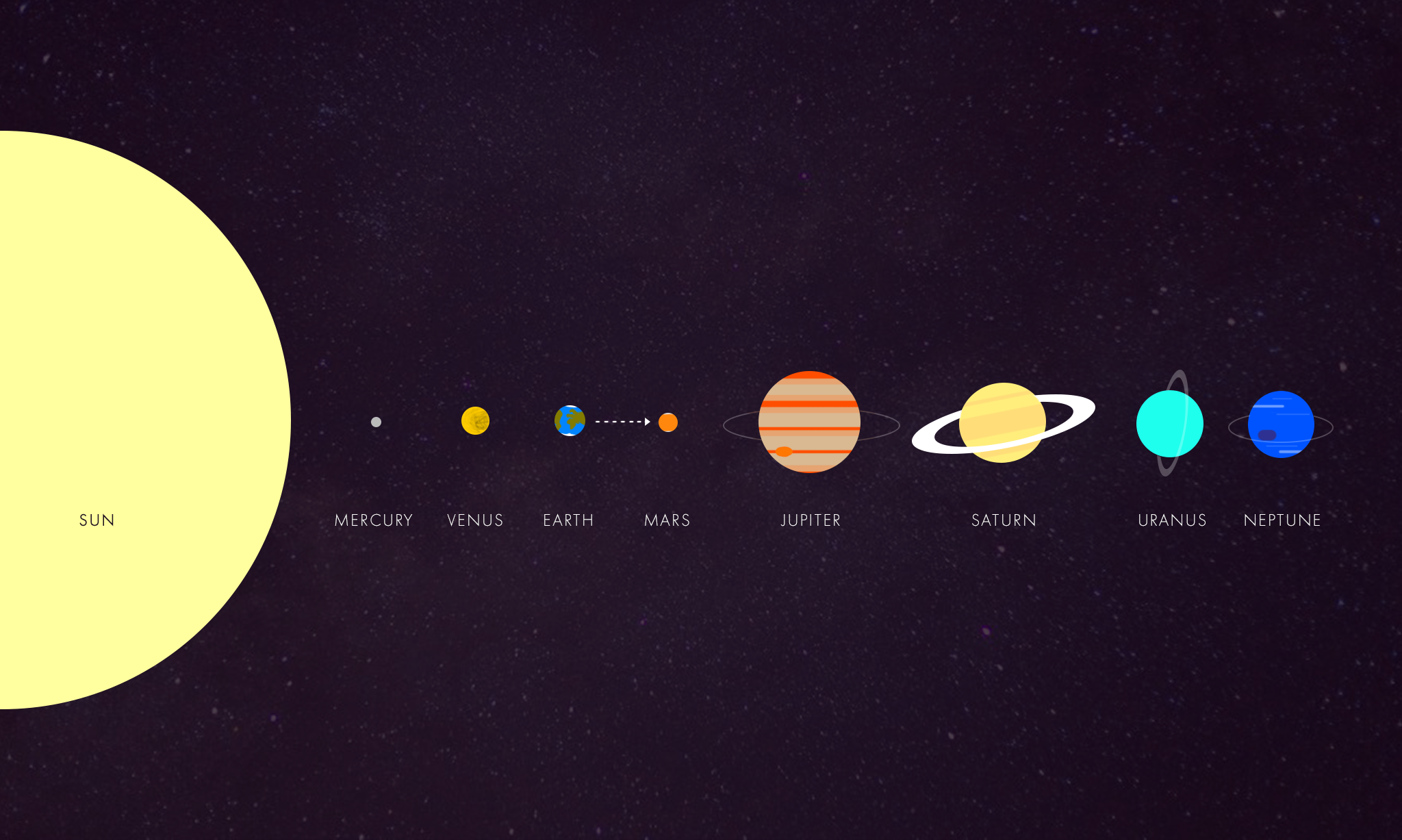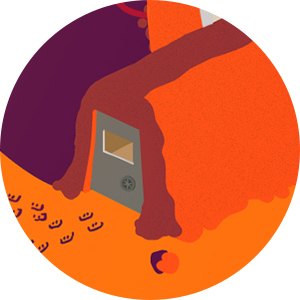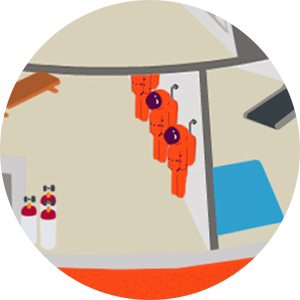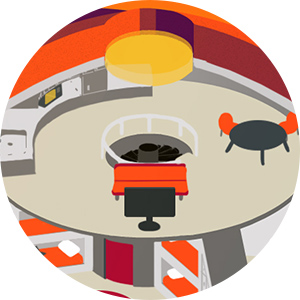As the race to land a human on Mars steams ahead, have you ever wondered what life on the red planet would actually be like?
In-home experts at Hillarys have teamed up with Prof. Lewis Dartnell at the University of Westminster, to envisage how the ordinary home might look and function on Mars.
Why would we go to Mars?
While the idea of blasting off in a rocket to start a new life on another planet might seem like the stuff of sci-fi fantasy, some of the world’s biggest private companies and governments are currently locked in a race to land humans on Mars.
Space X, Mars One, NASA and the United Arab Emirates have all expressed an interest in exploring the red planet, with Space X founder Elon Musk hoping to have crewed rockets sent to Mars as early as 2024.
The surface of Mars is also somewhat reminiscent of ours, with areas of highland, rocky valleys and smooth plains
But why Mars? The most common argument is that having been to the moon, Mars is the next logical step for scientific progress. The second is that a global catastrophe, like an asteroid impact, could potentially wipe-out humanity on Earth and we would be wise to have self-sustaining outposts in space – to not keep all our eggs in one basket.
In this case, our red neighbour may be our best option compared to other planets or moons nearby – our own moon’s lack of atmosphere and exceedingly dry surface would mean we’d struggle to live there, while the immense air pressure and searing temperatures on Venus would kill us almost immediately.

What is Mars like to live on?
Despite being only half the size Earth, Mars does have some features which would be recognisable to the human race.
As well as distinctive weather patterns including dust storms, frost and fog, the red planet also experiences seasons much like Earth, but for twice as long.
The surface of Mars is also somewhat reminiscent of ours, with areas of highland, rocky valleys and smooth plains.
One of the biggest challenges to human settlers would no doubt be the chilly temperatures. Although the surface of Mars can reach a mild 20°C on the equator in the peak of summer, the rest of the year is punishingly cold.
What would our homes look like?


1. Airlock front door
The atmosphere on Mars is much thinner than on Earth, and is comprised almost entirely of carbon dioxide. Therefore, much like a plane, houses would need to be pressurised and totally airtight to prevent loss of oxygen or pressure – both of which could have deadly consequences.
In order to do this, the entrance to the house would need to have two sealable doors separated by a short corridor to create an airlock. This way, you could enter and exit without depressurising the rest of the house.
The thinner atmosphere means that homes would also need to be protected from higher levels of radiation. This would be done by burying houses in 2 – 3 metres of soil.

2. Spacesuit storage
Enter any ordinary home and you might expect to find coat racks packed with jackets, scarves and umbrellas, or perhaps a mound of various shoes that are promptly kicked off at the door.
Really this would be no different in Mars, except instead of your raincoat, it would be your spacesuit hanging in the hallway.
With conditions outside so harsh, there would be no such thing as just ‘popping out’ for a walk or to see a friend. Instead, a trip outside would require rigorous preparation, including putting on a fully pressurised space suit with breathing apparatus.

3. Home gym
On Earth, human bodies are constantly working against gravity, and as a result our muscles and skeletons have all adapted to deal with this daily workout.
With gravity on Mars being just a third of that on Earth, humans could run the risk of muscle wastage and other health issues. A home gym would help us maintain muscle mass and stay fit.

4. Machinery room
This would contain the necessary machinery for generating oxygen and recycling water for your home. While power would come from the home’s own solar panels, electrolysis would be used to split water into hydrogen and oxygen for breathing.
Water would be extracted from the ice reserves found under Mars’ surface, which would need to be ‘mined’.

5. Bathroom
For the most part, a bathroom on Mars would function in the same way as on Earth. However, more effort would need to be made to reuse and reduce waste. Urine would be filtered, purified and added back into the home’s water supply, while other waste would be used to create ‘humanure’ for fertilising plants!

6. Bedroom
Ironically, the one thing that you wouldn’t find much of in space is your own personal space. Because of the need to create pressurised structures, living quarters would be much smaller and compact, so your bedroom would need to be cleverly designed to fit in everything you need.

7. Living area
You might want to brush up on your skills in the kitchen before you head off to Mars, as there would be no pizza parlour or Chinese takeaway nearby!
Entertainment would also be an issue, as we wouldn’t be able to head out to the cinema or the pub with friends. Instead, leisure time would be spent socialising with your housemates, playing games, or recording video messages to transmit back to friends and family on Earth.
The 20 minute transmission delay from Earth to Mars means that live TV broadcasts would be out of the question – but at least you wouldn’t come across any spoilers! Instead, films and box sets could be slowly downloaded onto a server.

8. Light shaft
Exposure to natural sunlight is essential for our mental health and wellbeing. However, the harsh conditions outside means it wouldn’t be possible for us to head out for a walk or sunbathe in the park.
Instead, we’d have to rely on getting natural light into our homes. This in itself would be tricky, as windows would need to be limited due to the high levels of radiation outside – there would be no gazing out at the sunset each evening!
A small skylight would provide some much needed light, without allowing too much radiation into the home.

9. Greenhouse
Every home would need to be totally self-sufficient, so food would need to be grown in inflatable greenhouses. Fortunately, Martian soil has most of the nutrients needed to grow crops, and previous studies have seen tomatoes, wheat and other produce successfully grown in simulated Martian soil.
Bad news for hardcore carnivores though – we’d also need to eat an almost exclusively vegan diet, as keeping livestock in Martian conditions would be far too difficult. In fact, the only animal protein you’d be likely to get would be from insects, which take up little space and can be fed on plant waste – beetle burgers, anyone?

10. Solar panels
The simplest way for us to generate energy for our homes would be through solar panels. However, these would need careful maintenance to keep them running - Mars is subject to enormous dust storms, after which we’d need to pop on our space suits and head out with a broom to clean them off.
Other things to consider
Uprooting and moving to a different planet would also come with a huge psychological and emotional aspect that we would need to prepare for.
As well as being almost entirely confined to your own home, communicating with any loved ones back on Earth would be almost impossible.
A quick catch up via phone or video call would be out of the question, thanks to a 20 minute delay in transmission either way – meaning that you’d need to wait up to 40 minutes for a response during conversation!
Visiting Earth to see friends and family, pick up additional supplies or seek medical help would also be incredibly difficult. Because the Earth and Mars both orbit the sun, they only come close enough for a ‘launch window’ about every two years.
THE EXPERT'S OPINION
“Humanity will venture out through the solar system probably sooner rather than later, and Mars is the most enticing location to move house. To survive on the red planet, Martian houses will have to look a lot like what we’ve depicted here. But although living on Mars may sound exciting, would you want to spend most of your days indoors and not able to phone your friends and family back on Earth?”
- Prof. Lewis Dartnell

Take our survey
If you had the opportunity, would you move to Mars?
If you had the opportunity, would you move to Mars?
Thanks for submitting your answer.
Yes, absolutely!
I’m still not sure.
No way!


